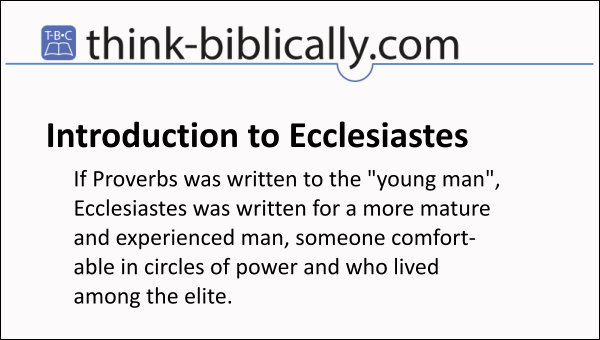By Tyson Thorne

If Proverbs was written to the "young man", Ecclesiastes was written for a more mature and experienced man, someone comfortable in circles of power and who lived among the elite. The original audience was expected to be knowledgeable, rich in wealth and material possessions. They were people who needed to hear the message of wisdom this books offers: all the privilege of wealth and power may be intoxicating while you have it but becomes fleeting and meaningless, a "chasing after the wind." Life without God expresses vanity, but with God life has substantially more value, purpose and meaning.
There are a few considerations one must have while reading the book. First, the name Ecclesiastes is Greek for "preacher," and the name the author takes, Koheleth, is a Hebrew word meaning "teacher". The author therefore is claiming the knowledge and training to write a wisdom book. Also, the author begins arguing about the meaning of life from a secular point of view. The phrase "under the sun" is life on earth without God. The book does eventually show the wisdom of life with God, so it become a kind of apologetic leading someone who doesn't concern himself with God or a religious life and shows why that need to change.
Author and Date of Writing
Tradition associates Solomon as the author of Ecclesiastes. As is the case most of the time, liberal scholars debate that premise and propose that it was written much later — probably post-exilic — and therefor could not have been authored by Solomon. While some statements in the book are hard to relate to Solomon, most reinforce the traditional belief. The author says he was the "son of David, king in Jerusalem." The accomplishments mentioned in the book — the building projects, the amassing of wealth, possession of wisdom— all relate to Solomon. Furthermore, Solomon had the time and ability to chase after everything discussed in the book since the kingdom was mostly at peace under his reign. Assuming Solomon as the author, the book would have been written late in his life, probably around 940 BC.
Structure of the Book
i. Prologue, 1.1-3
ii. Demonstrating Futility, 1.4-3.22
iii. Developments of Futility, 4.1-12.8
iv. Epilogue, 12.9-14
